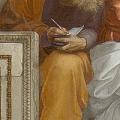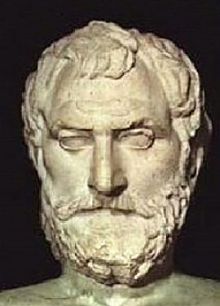1 - Everything is Full of Gods: Thales
Posted on
In this episode, Peter Adamson of King's College London introduces the podcast as a whole, and the thought of the early Greek philosophers called the Presocratics. He also discusses the first Presocratic philosopher, Thales of Miletus.
Themes:
Further Reading
K. Algra, "The Beginnings of Cosmology," in A.A. Long, The Cambridge Companion to Early Greek Philosophy (Cambridge: Cambridge University Press, 1999), 45–65
D.W. Graham, Explaining the Cosmos: The Ionian Tradition of Scientific Philosophy (Princeton: Princeton University Press, 2006)
E. Hussey, “The beginnings of epistemology: from Homer to Philolaus,” in Epistemology, ed. S. Everson [Companions to Ancient Thought: 1] (Cambridge: Cambridge University Press, 1990), 11-38






Comments
In reply to Thales's main theoretical contribution to Western philosophy? by Joó Gábor
Thales
Thanks! Yes that makes sense but I'd probably be more cautious and ascribe this breakthrough to the early Presocratics more generally rather than Thales in particular. It's highly dubious that he thought everything comes from water the way that the Stoics think everything comes from fire, though maybe this kind of "material monism" does emerge somehow amongst the Presocratics that come prior to Parmenides. It's really Aristotle who tries to fit Thales into that sort of picture. Also worth noting is that it seems to be an idea we can find in non-Mediterranean cultures, e.g. in the Upanisads (see the episodes on that in the India series...).
In reply to Thales by Peter Adamson
"I'd probably be more…
"I'd probably be more cautious and ascribe this breakthrough to the early Presocratics more generally rather than Thales in particular."
- yeah I agree, this sounds like a more cautious approach. I guess we could say it was a cluster of thinkers who broke with traditional cosmology then?
Thanks for the reply, I'll definitely check out the episode on the Upanisads!
In reply to "I'd probably be more… by Joó Gábor
Material monism
Yes, exactly. Anaximines actually seems to be a good candidate with his account based on air, which sounds more like air is actually transforming into the other elements. But it seems to have been an intituion driving all the Milesians and also Heraclitus (in his case, fire).
Add new comment